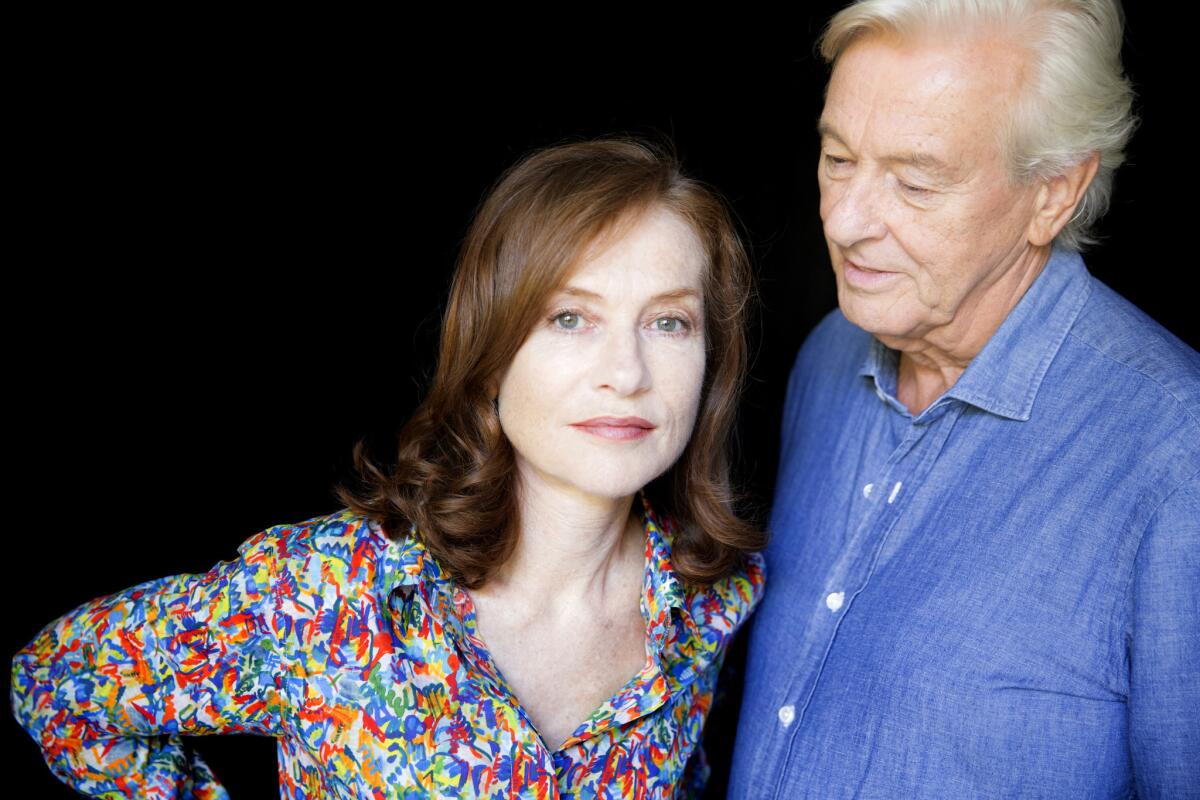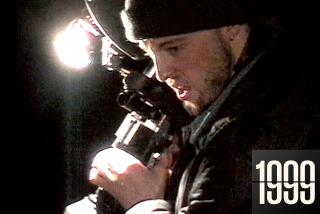Paul Verhoeven and Isabelle Huppert lean into the incendiary revenge of ‘Elle’

They are two names who conjure strong images for serious movie fans and a pairing that implies a fearsome, ferocious collaboration: Actress Isabelle Huppert, with a screen persona equal parts sensual and imperious, coupled with director Paul Verhoeven, the madman provocateur behind such films as “Basic Instinct,” “Showgirls” and “Starship Troopers.”
Add to that early reports that their collaboration on “Elle” would be a rape-revenge tale and the stage was set for something truly transgressive.
Except it isn’t quite that and almost didn’t happen at all. An adaptation of Philippe Djian’s 2012 novel “Oh…” with a screenplay by David Birke, the project was initially to be set in America with a Hollywood actress as its star. But Verhoeven couldn’t find anyone in the U.S. willing to appear in it.
Verhoeven says he was surprised, noting “the moral implications, wrongly seen, can easily be read in the wrong way. And the movie doesn’t do that. But we had an American screenwriter and I knew it went out and after two months, nothing. It was really the idea to make it as an American movie. And I’m glad we did not.”
“I’m glad too,” said a chipper Huppert, sitting by Verhoeven’s side during a recent interview on an outdoor patio at an upscale hotel in Beverly Hills. They make quite a pair together, both of them warmer than their résumés may lead one to expect.
Their movie has become one of the most talked-about of the year, sparking debate over its cagey treatment of rape. Writing about the film following its premiere earlier this year at the Cannes Film Festival, Times critic Justin Chang said the film “risks offending certain sensibilities” while also calling it “breathtakingly elegant and continually surprising.” More recently New York Times critic A.O. Scott hailed the film as “a masterpiece of suave perversity” while celebrating it as “a duet for director and star.”
In the film, now playing in Los Angeles, Huppert plays Michèle Leblanc, CEO of a video-game company and divorced mother who in the first scene of the movie is raped in her home. She seems discomfortingly unfazed by the attack, perhaps emotionally compartmentalizing it in the same way she has the implications that as a child she somehow assisted her father in a murder spree. She eventually discovers the identity of her attacker and begins to exact an enigmatic revenge all her own.
“She exists in a sort of in-between space; in between, I would say, victim and avenger,” said Huppert of the character. “But that’s what made her so contemporary. Michèle does take revenge in her own way, but not the way you would expect. She takes the whole thing almost like an existential experience. Otherwise, there would not be a film, if it was the way you expect it would take 10 minutes.”
Huppert, 63, is among the most celebrated actresses in world cinema. She is a two-time winner of the actress award at Cannes, and has been nominated for France’s Cesar award 15 times, more than any other actress, though she has won only once. And yet she has never been nominated for an Academy Award.
For the Dutch-born Verhoeven, 78, who made a string of movies in Hollywood before returning to filmmaking in Europe with 2006’s WWII resistance drama “Black Book,” the new film is his first to be made in France. Verhoeven, who spoke French when he was younger but had largely forgotten it, had to take a crash course in the language before production began. “Elle” has been selected as this year’s French submission to the Academy Awards in the foreign-language film category.
She exists in a sort of in-between space, in between, I would say, victim and avenger.
— Isabelle Huppert on her role in ‘Elle’
“I always have been looking at things that I have not done,” said Verhoeven. “I really escaped every sequel, be it ‘Robocop’ or ‘Total Recall’ or whatever, and this was something I had never done. It was a surprise to myself. If I read scripts nowadays and I think it has been done already, I won’t do it anymore. I get bored.”
When he was first sent Djian’s novel by producer Saïd Ben Saïd however, his response was something different. “I really felt, I don’t dare to do this,” he said. “I’m afraid of it because it’s something I have never really done, so I should do it.”
Inarguably the film’s most playing-with-fire element is its depiction of the rape and how Michèle doesn’t react in a typical way. The film’s unexpected tone has led some to describe it as a “rape comedy,” a term Verhoeven decried to the Guardian earlier this year at Cannes: “It’s rape and there is comedy. You’re not laughing at all when she gets raped.”
Huppert and Verhoeven have frequently described the tone of the film as a fairy tale, also finding in that term a way to push the story out of the realm of the literal and into a more abstract space.
“The fairy tale aspect of the film is like an answer to someone who would think that this is a grand statement about certain situations or sexual situations,” said Huppert. “No, it’s a fiction, it’s a fantasy, and it’s just an exploration of a single case.”
Likewise, for Verhoeven, part of what was exciting about the story was the possibility “to go against the norm and to avoid the cliché. We know these things happen but we try to have a moral point of view and the movie doesn’t say that, the movie doesn’t make any moral point. The movie on purpose leaves it to the audience.”
Huppert will also soon be seen in the upcoming “Things to Come,” directed by Mia Hansen-Løve, in which she plays a philosophy professor whose husband abruptly leaves her. The two performances are complimentary to each other, elevating just how distinctive a performer Huppert can be, breezy in one role, steely in the other.
Her ironic onscreen inscrutability in “Elle” and the way in which the film refuses specific answers regarding Michèle’s inner life, is for Huppert one of the great joys of screen acting.
“When you have a story where you have a chance to be ambiguous, that’s the best,” Huppert said. “You can say something and feel something else. You can make people believe there’s another meaning to what they are actually seeing on-screen. For me it’s the best of what cinema gives you as a spectator and as an actress.”
SIGN UP for the free Indie Focus movies newsletter »
Follow on Twitter: @IndieFocus
Also
Enter the mesmerizing world of magic, sex and Anna Biller’s ‘The Love Witch’
Warren Beatty talks Madonna, ‘Ishtar,’ his conquests, his new movie and just about everything else
Rebecca Hall and the makers of ‘Christine’ explore a real-life tragedy
More to Read
Only good movies
Get the Indie Focus newsletter, Mark Olsen's weekly guide to the world of cinema.
You may occasionally receive promotional content from the Los Angeles Times.









